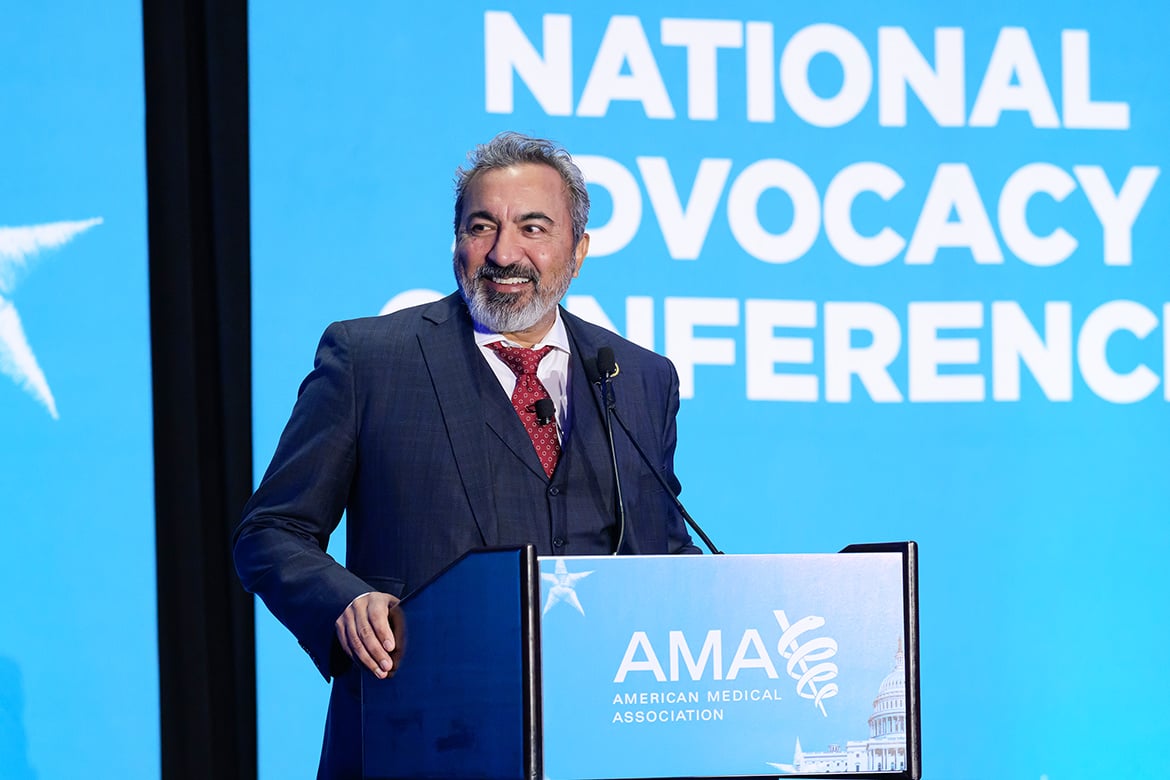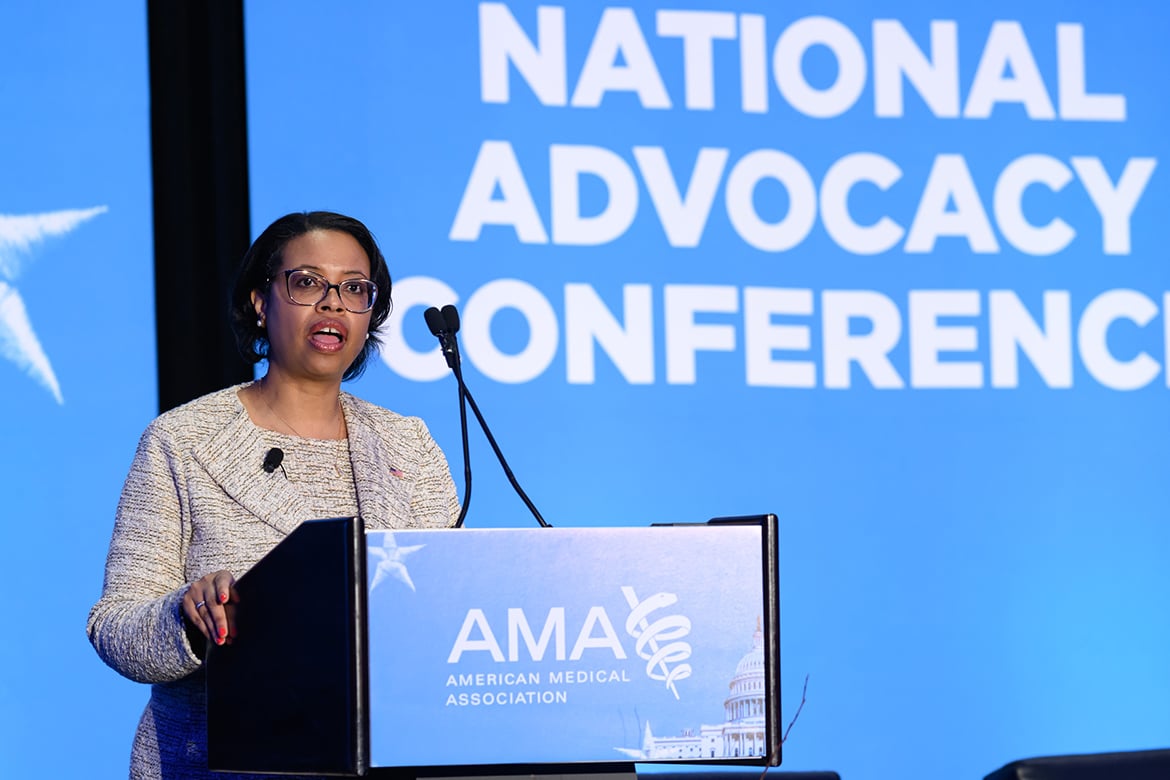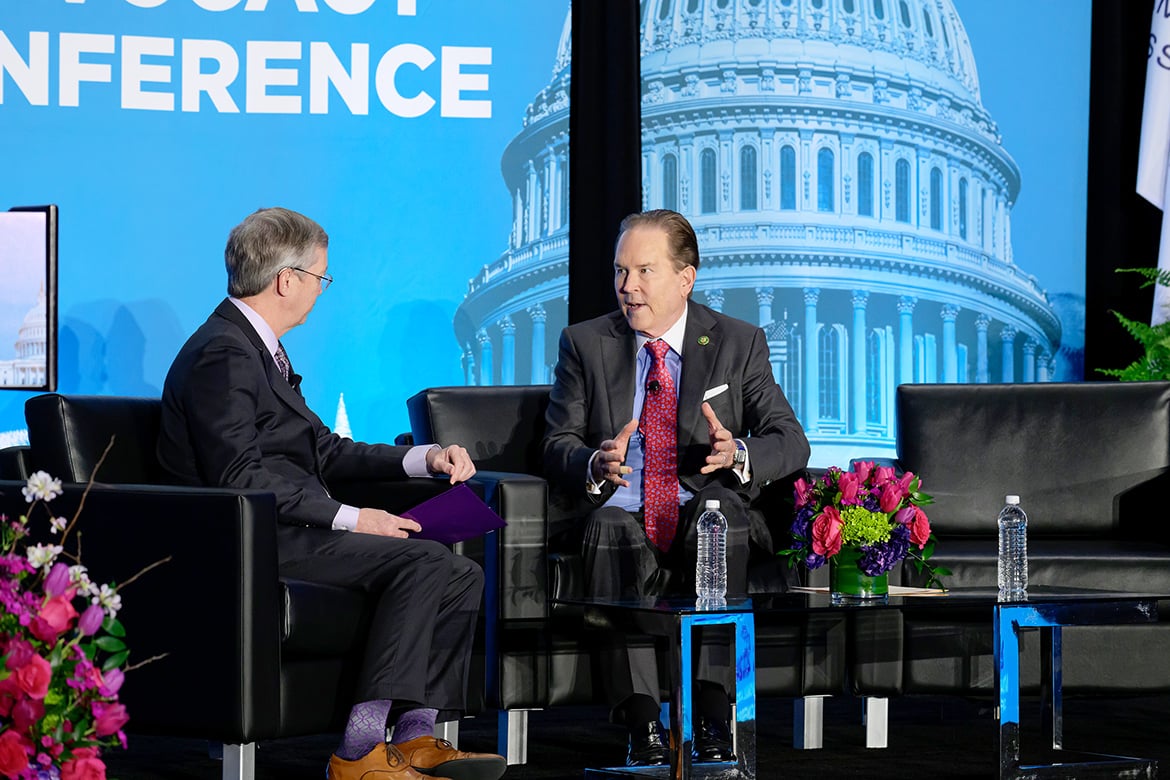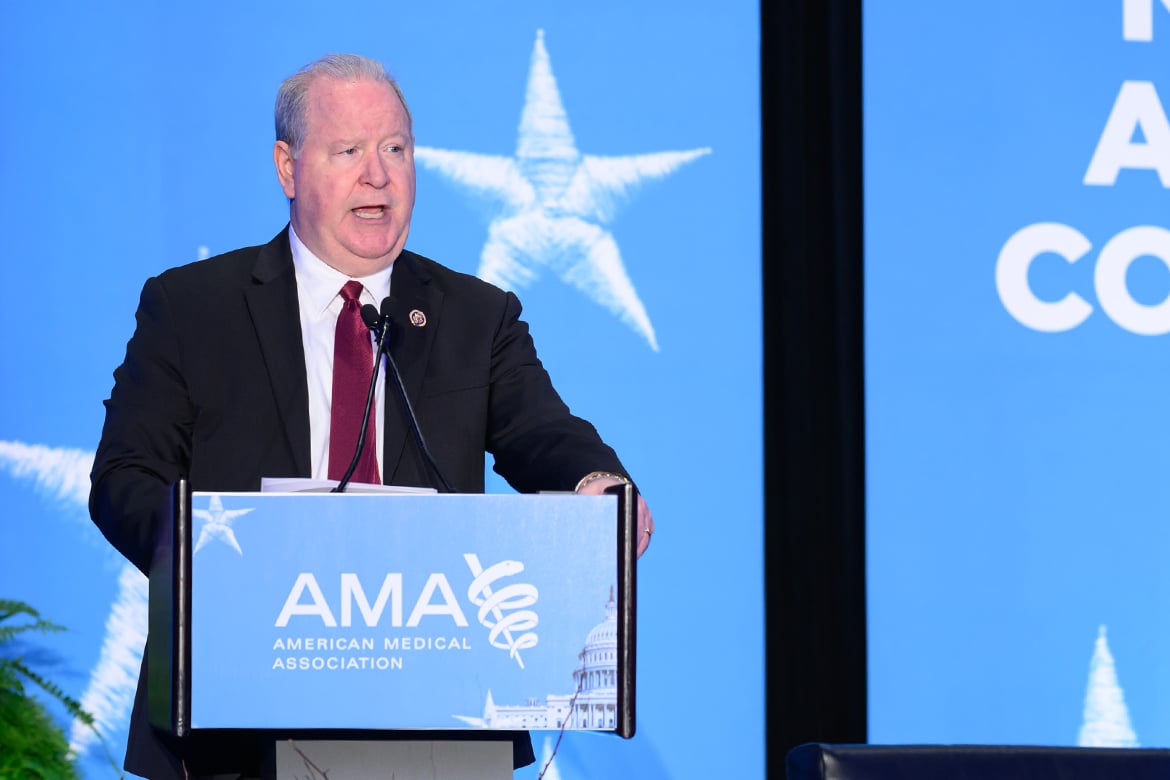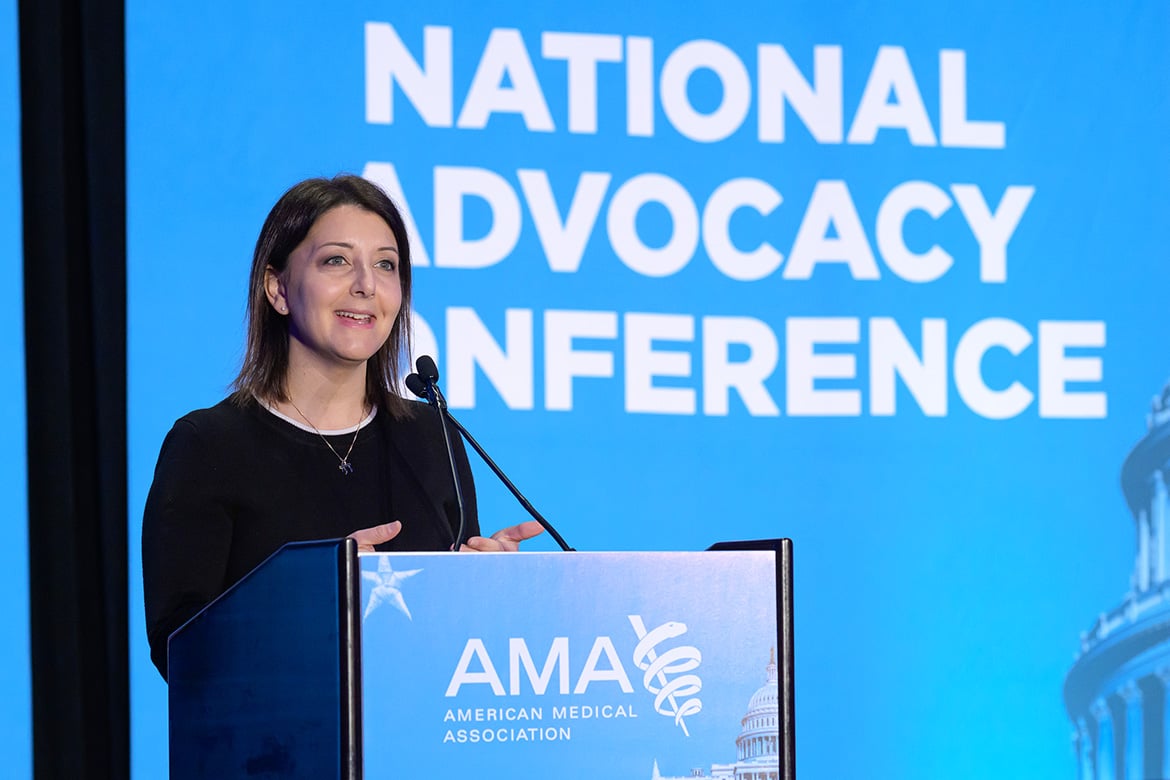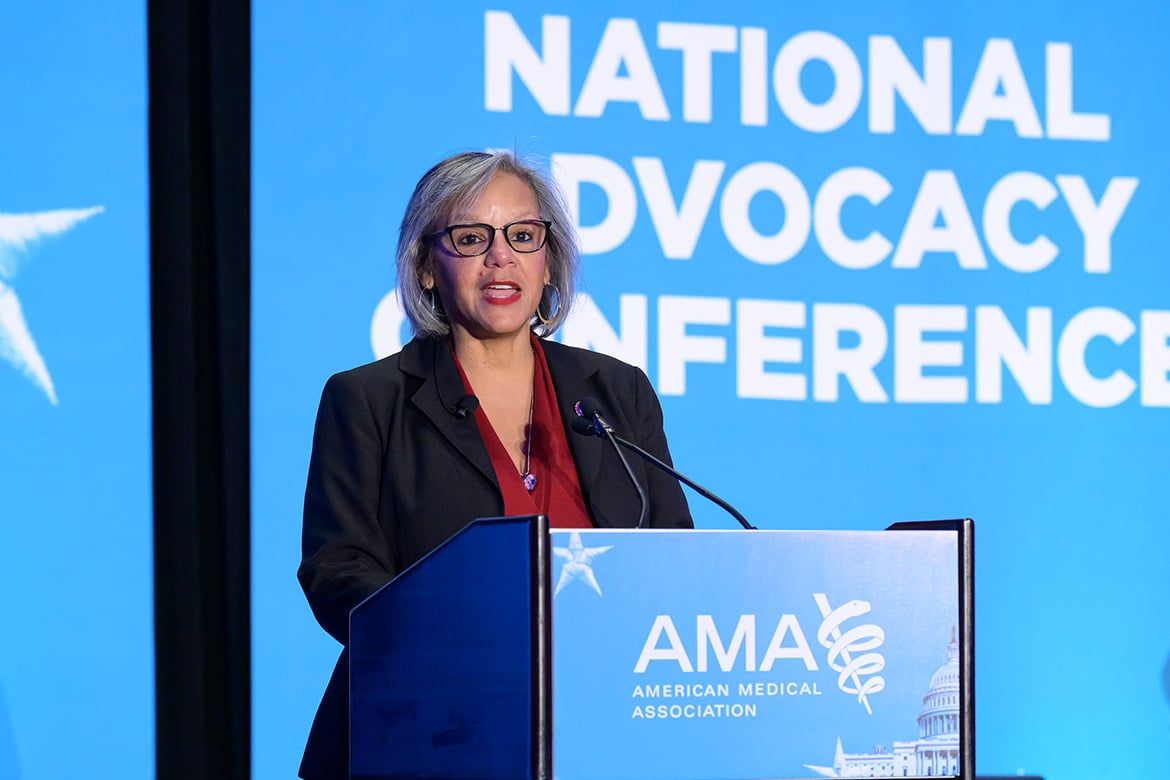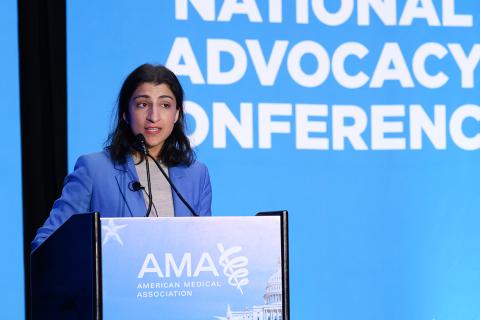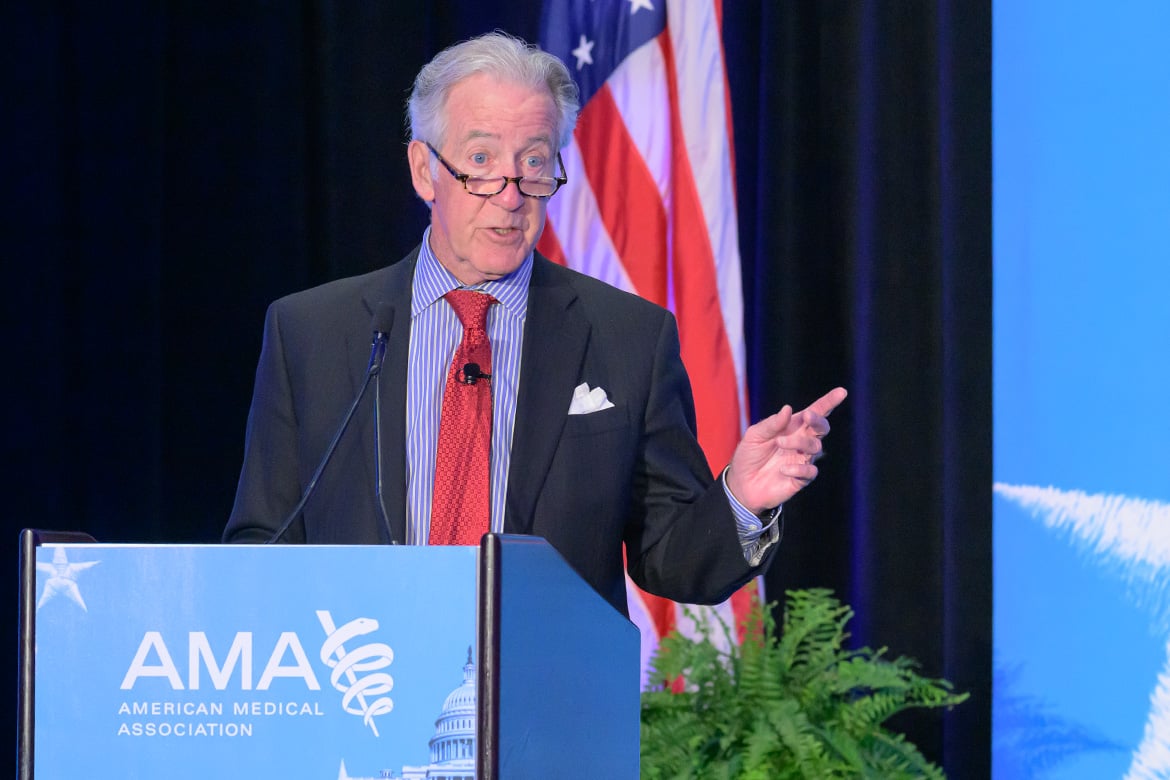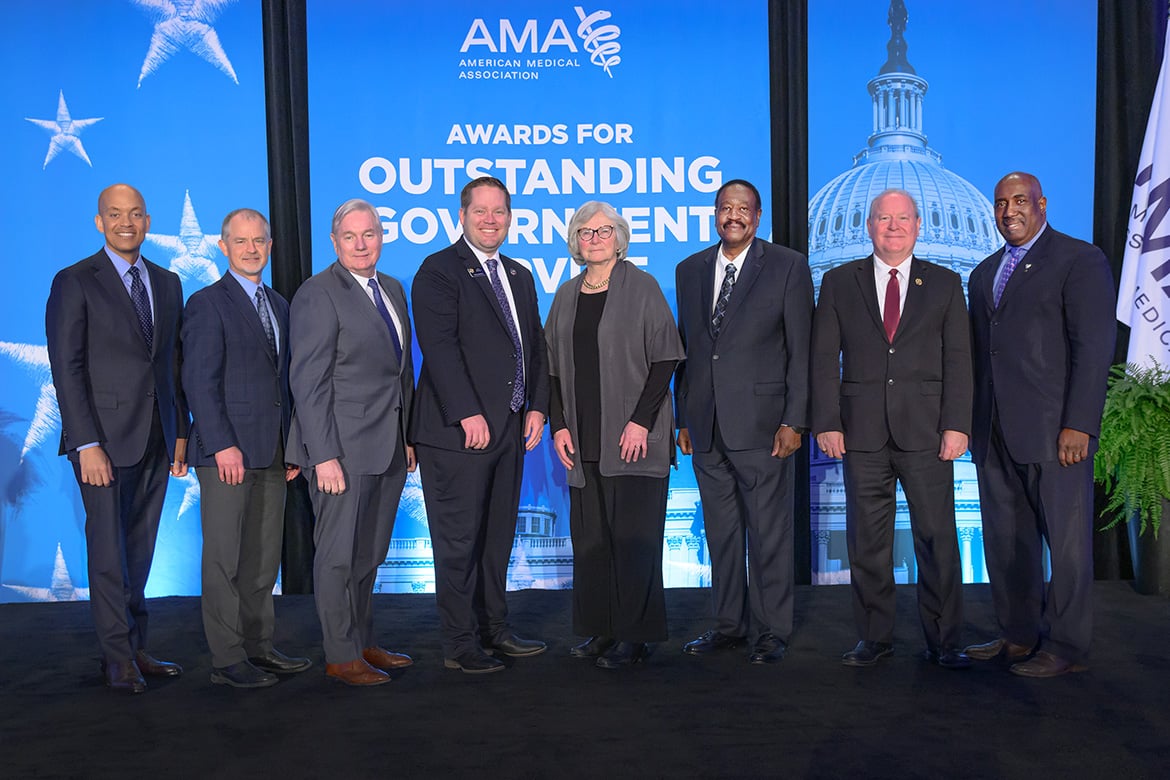Highlights from the 2024 AMA National Advocacy Conference
Last week, hundreds of physician leaders and advocates, medical society staff and others from across the country came together in Washington, D.C., for the annual AMA National Advocacy Conference.
Physicians took to the Hill to advocate directly to their Senators and Representatives on key health care legislation, using the AMA’s action kit (PDF) to guide their advocacy on topics such as Medicare payment reform, physician workforce issues and more.
Throughout the conference, speakers from Congress and the administration shared their insights on health care priorities. Here are some of the highlights:
Rep. Ami Bera, MD (D-CA)
As a House member who does not sit any committees with jurisdiction over health care, Rep. Ami Bera, MD (D-CA), spoke about enjoying his freedom from committee politics and working with Rep. Bucshon on leading bipartisan legislation on physician priorities that are foundational to the practice of medicine. As a physician member of Congress, he has a much better understanding of the challenges physicians face in running a practice and he discussed his support for legislation to provide physicians with an inflation-based update in the Medicare program.
Rep. Bera, a member and founder of the House Problem Solvers Caucus, has also introduced legislation to streamline the Medicare Advantage prior authorization process to help reduce physician burden and burnout. He is hopeful the bill—the Improving Seniors’ Timely Access to Care Act—which has broad bipartisan support, will get a less costly score from the Congressional Budget Office and advance during this session of Congress. He is passionate about building the physician workforce and discussed his idea for an all-payer model to fund more residency positions so we can train enough physicians to meet patient need. He is optimistic about the future of medicine and thinks in time and with the help of Congress, we will build a more stable Medicare program that provides high-value, patient-centered care.
Chiquita Brooks-LaSure, administrator, Centers for Medicare & Medicaid Services
Under the leadership of Administrator Chiquita Brooks-LaSure, the Centers for Medicare & Medicaid Services (CMS) is responsible for the health care coverage of more than 160 million people enrolled in the three Ms—Medicare, Medicaid and the Children’s Health Insurance Program, and the Health Insurance Marketplaces. In her remarks, Administrator Brooks-LaSure discussed efforts to ensure that all those eligible for coverage are enrolled and able to access the care they need—and expressed the particular importance of ensuring that this access is equitable.
Administrator Brooks-LaSure highlighted physicians as “critical messengers” in helping patients understand their health care coverage, as well as their “primary advocate, champion, and collaborator” in navigating the health care system. She also noted the importance of physician voices in the development of CMS policies.
Rep. Vern Buchanan (R-FL)
Ways and Means Health Subcommittee Chairman Vern Buchanan sat down with AMA President-elect Bruce Scott, MD, to discuss numerous issues of concern for America’s physicians. Chairman Buchanan, citing his own background in managing a small business, recognized that the current system with no inflationary updates is unsustainable in the long run, and Congress must address the 3.37% cut to Medicare physician payments that went into effect on Jan. 1. During the conversation, Chairman Buchanan repeatedly focused on the importance of preventive care. He noted that with the health care sector comprising roughly 20% of the U.S. economy, coupled with widespread shortages of health care professionals, including physicians, it was imperative that Americans become “CEOs of their own health.”
During the wide-ranging conversation, Chairman Buchanan and Dr. Scott also discussed medical liability reform, the impact of consolidation in health care and the promise of augmented intelligence. On a personal note, Rep. Buchanan talked about his bipartisan bill to ensure that seniors have access to breakthrough medicines to treat Alzheimer’s disease. His bill, the MERIT Act, was advanced out of the House Energy and Commerce Committee.
Rep. Larry Bucshon, MD (R-IN)
Rep. Larry Bucshon (R-FL) opened the congressional remarks at the National Advocacy Conference with his insight on the status of physician priorities in the bill to fund the government beyond March 2024. Dr. Bucshon expressed optimism that Congress would reverse part of the 3.37% Medicare physician payment cut physicians received on Jan. 1, 2024, and encouraged attendees to continue pushing for an annual Medicare physician payment update tied to inflation, as is included in H.R. 2474, the Strengthening Medicare for Patients and Providers Act.
Dr. Bucshon noted the need for Congress to act this year and pass the Improving Seniors’ Timely Access to Care Act, a bipartisan bill to reform prior authorization in Medicare Advantage. Dr. Bucshon also stressed the need for proper implementation of the No Surprises Act and discussed his bipartisan legislation, H.R. 2584, the Safety from Violence for Healthcare Employees (SAVE) Act, aiming to protect health professionals and patients from violence within hospitals.
Mandy K. Cohen, MD, MPH, director, Centers for Disease Control and Prevention
Dr. Cohen’s remarks focused on the importance of operating as a team and bringing together the clinical practice of medicine with public health. To accomplish this, she highlighted three key strategies: data integration, aligned priorities and shared investments, and clear roles and responsibilities.
Discussing growing threats to our nation’s health—from emerging infectious diseases to climate change—Dr. Cohen also emphasized the need to be “modernizing and meeting the moment.”
Dr. Cohen concluded by outlining several action items for physicians: (1) fostering relationships between health care and public health at the state and local levels, and (2) “flooding the zone” on social media and in the community with good, evidence-based public health information.
Rep. Robin Kelly (D-IL)
Rep. Robin Kelly (D-IL) championed H.R. 6371, the Provider Reimbursement Stability Act of 2023. This legislation aims to rectify the perennial issue of annual cuts to physician pay by introducing long-awaited reforms to the flawed Medicare physician payment system's budget neutrality process.
In her session, Rep. Kelly also talked about her work to extend postpartum Medicaid coverage from 60 days to 12 months to improve maternal outcomes, as well as the launch of the Congressional Digital Health Caucus focused on educating members of Congress on AI and other innovative technologies in health care.
Lina M. Khan, chair, Federal Trade Commission
In her remarks, Federal Trade Commission (FTC) Chair Lina M. Khan announced that the FTC and the Department of Health and Human Services (HHS) were partnering to launch an investigation into generic drug shortages and the practices of “middlemen” involved in the supply chain.
The investigation looks to focus on group purchasing organizations and drug wholesalers and distributors. FTC and HHS plan to thoroughly investigate whether these groups inappropriately used their market power in a highly consolidated industry to drive down the prices of generic drugs. Should the price of generic drugs get too low, manufacturers are forced to discontinue products due to impacts on profitability.
Rep. Richard Neal (D-MA)
The National Advocacy Conference concluded with remarks from House Ways and Means Ranking Member Richard Neal, praising the AMA for its ongoing expertise and highlighting Massachusetts' critical role in health care. Citing strong enrollment statistics for 2024, Neal emphasized the crucial part the Affordable Care Act plays in providing health insurance for Americans, and Massachusetts' role as a national leader among the states in achieving high health insurance coverage rates for adults and children.
Delving into legislative achievements during the 116th and 117th Congresses, Rep. Neal lauded the enactment of crucial bills such as the CARES Act, American Rescue Plan Act, and the Infrastructure Investment and Jobs Act. Stressing the need for bipartisan collaboration in Congress, he outlined the importance of working across party lines to pass impactful legislation. He also discussed the positive effect that the No Surprises Act is having for patients but lamented how agencies have interpreted the law in ways that he feels do not match Congressional intent.
Rep. Neal expressed appreciation for the fiscal and workload challenges physicians face. During the Q&A session, he passionately advocated for Congress to include provisions in an upcoming legislative package to extend funding for the federal government beyond March 8, in order to reverse the 3.37% cut physicians experienced on Jan. 1, 2024. In pursuit of this policy objective, Neal urged physician advocates to encourage bipartisan cooperation. He specifically called on Republicans and Democrats to collaborate on a bill that would fund the government beyond March 2024. Additionally, he reiterated his support for legislation providing physicians with an annual inflationary update in Medicare. He also endorsed the Improving Seniors' Timely Access to Care Act, a bipartisan initiative aimed at streamlining prior authorization in Medicare Advantage.
For more information on the speakers and sessions at this year’s conference, view the complete agenda (PDF).
Make sure to save the date for the 2025 AMA National Advocacy Conference—Feb. 10-12 at the Grand Hyatt Washington.
AMA grants six Outstanding Government Service Awards
As part of last week’s National Advocacy Conference, six recipients were honored with an AMA Award for Outstanding Government Service. The AMA awards honor elected officials and career government employees at the local, state and federal levels for their significant contributions to the advancement of public health and the promotion of the art and science of medicine.
This year’s recipients include:
- Larry Bucshon, MD (R-IN), representative, U.S. House of Representatives
- Richard A. Evans, MD, former representative, Maine House of Representatives
- Jan Malcolm, former commissioner, Minnesota Department of Health
- Kyle Mullica, senator, Colorado Senate
- Michael T. Osterholm, PhD, MPH, director, Center for Infectious Disease Research and Policy, University of Minnesota
- Russell S. Thomas, PhD, director, Center for Computational Toxicology and Exposure in the Office of Research and Development, U.S. Environmental Protection Agency
Learn more about the work of each award recipient and the AMA Awards for Outstanding Government Service.
More articles in this issue
- Feb. 23, 2024: Medicare Payment Reform Advocacy Update
- Feb. 23, 2024: National Advocacy Update
- Feb. 23, 2024: State Advocacy Update
